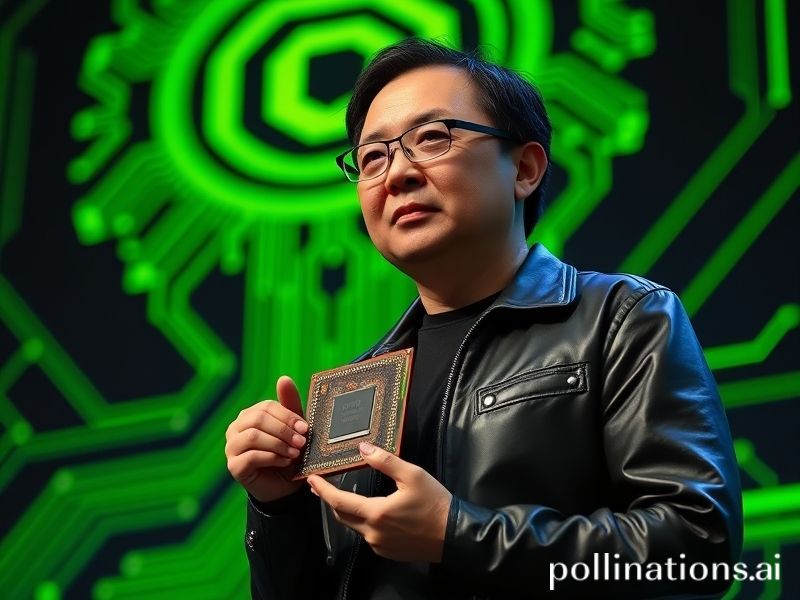Jensen Huang: The Leather-Jacketed Cartel Boss of Global AI Addiction
The Man Who Gave the World Its Newest Addiction—And Pretended He Was Just Selling Pickaxes
By Dave’s Locker International Desk
Somewhere between the karaoke bars of Taipei and the fluorescent purgatory of a Santa Clara conference room, Jensen Huang has spent the last thirty years convincing otherwise sober governments that their future depends on a graphics card. Not just any graphics card, mind you, but the kind that can simultaneously render a Pixar sequel and simulate the heat death of the universe—preferably before lunch.
Huang’s Nvidia, once a humble maker of pixel pushers for teenage gamers, is now the geopolitical equivalent of OPEC for math. If you want to train an AI to write Russian propaganda, spot French protestors, or automate the last human cashier in Finland, you need his silicon. And like any good dealer, he’s jacked up the price just enough to keep the addicts polite. One A100 chip costs roughly the GDP of a small Balkan village; the new H100 is rumored to be priced somewhere between a kidney and a conscience.
The international scramble to secure these coveted rectangles has been nothing short of operatic. Germany dispatched its economy minister to Taipei with the enthusiasm of a Tinder date who swiped right on GDP growth. Canada, still high on its own maple-scented supply of moral superiority, discovered that ethical AI requires the same chips as unethical AI—news that reportedly caused a minor riot in Ottawa’s Whole Foods. Meanwhile, the Saudi sovereign wealth fund, never one to miss a good apocalypse investment, has reportedly ordered enough GPUs to simulate every possible future in which oil remains relevant.
Washington, in its usual endearing panic, slapped export controls on the chips faster than you can say “containment strategy.” Beijing responded by banning the export of gallium and germanium, metals essential to chipmaking—essentially the geopolitical version of hiding the batteries from your little brother’s Xbox controller. The irony, of course, is that both superpowers are now locked in a frantic search for loopholes, proving once again that capitalism and communism are merely rival streaming services with the same binge-worthy content: paranoia and semiconductors.
Huang, meanwhile, glides through this mayhem in his trademark leather jacket, a garment that has become as emblematic of power as Mao’s was of revolution—though considerably more breathable in subtropical climates. He speaks in parables about “accelerated computing,” which sounds vaguely spiritual until you realize it’s just a fancy way of saying, “Pay me or your algorithms will be as slow as Italian bureaucracy.” His keynote speeches have the hypnotic cadence of a TED Talk delivered by Darth Vader, equal parts TED and Sith Lord.
The collateral damage is piling up. European startups are discovering that “innovation” is now defined as whatever you can cobble together on a single rented GPU in an Irish server farm between 3 a.m. and 5 a.m. when American demand is asleep. African researchers, meanwhile, are told to “leapfrog” straight to AI via mobile phones—an optimistic euphemism for trying to stream Netflix on a toaster. And let’s not forget the planet itself, quietly overheating in the background while data centers guzzle electricity like a freshman at his first open bar.
Yet Huang remains serenely unruffled, the Mona Lisa of Moore’s Law. When asked about supply shortages, he smiles the smile of a man who knows scarcity is merely profit spelled backward. When pressed on environmental costs, he gestures toward a PowerPoint slide promising “energy-efficient genocide of the human attention span.” Investors cheer, governments salute, and somewhere a data-center engineer sets another forest on fire to keep the matrix humming.
In the end, Jensen Huang has achieved the rarest of feats: he made the world dependent on a product nobody knew they needed, sold by a company nobody can pronounce, for purposes nobody fully understands. If that isn’t the essence of global capitalism in the 21st century, then I’ll eat my leather jacket—preferably one stitched together from recycled GPUs and the last shreds of democratic oversight.







